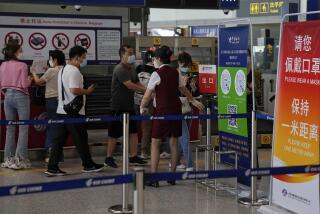China plays hardball on pre-Games visas
BEIJING — It was a farewell dinner, Chinese-style.
A dozen people seated around a large table awkwardly picked up morsels of food from a revolving platter and sipped from tall bottles of room-temperature beer. There was a joyless quality to the evening as the dozen or so assembled guests, Britons, Canadians and Americans who had come to China to teach English, contemplated their imminent departure on account of visa restrictions.
“I tell them not to say they’re being deported,” said Diana Wan, manager of the Shane English School. “This is Chinese government policy. There is nothing we can do about it until after the Olympics.”
As the Summer Olympics draw near, foreigners are discovering that the welcome mat they had expected is being abruptly rolled up. Thousands of foreigners have been kicked out before today’s deadline as a result of tough new visa policies. Those forced to leave include nondiplomatic support staffers at embassies, migrant workers, freelance writers, artists and students.
Exactly how many foreigners must leave China remains unclear because the government has released minimal information about the changes in visa policy. About 110,000 foreigners are registered as Beijing residents, and about the same number are living and working in the capital with tourist, student or investor visas. Many of those visas expired at the end of June and will not be renewed.
At the same time, most Chinese embassies and consulates are no longer issuing visas with more than 30-day validity and prospective tourists now have to show hotel reservations, plane tickets and other documentation.
Among the persona non grata are many young Westerners attracted by low rents, a lively cafe and bar scene and the buzz of living behind the former Iron Curtain, qualities that made Prague, the capital of the Czech Republic, an expatriate favorite last decade.
“We wanted to get into the way of life here,” said 24-year-old Natan Doyon, who moved from Britain last year with his girlfriend to teach English to Chinese children. He says his pupils were so upset when he told them he couldn’t renew his visa that they begged, “Don’t go. We’ll help you hide.”
He and his girlfriend now plan to try Vietnam.
So many English teachers are being forced to leave that many of the private language schools, the rage lately for children of the upwardly mobile, are closing down for the summer. With only three native English speakers left on its staff, Shane is cutting its summer camp in half and might curtail its fall program. Shane, which is owned by a British chain, advertises that it provides native English speakers.
“If we can’t fulfill that promise, we have nothing to sell,” Wan said. “We’re losing a lot of money.”
The new regulations are a disappointment to those who predicted that being the Summer Olympics host city would speed Beijing’s transformation into a modern, more cosmopolitan city.
“You have sort of an Olympic lockdown. The Chinese have decided they can’t leave anything to chance so they’ve shut down a lot of Beijing,” said Jeremy Goldkorn, a media analyst who has lived here for 12 years.
Instead of the crush anticipated for the Olympics, which begin Aug. 8, tourism is sharply down. The number of overseas visitors to Beijing in May was down 14.2% from May of last year.
The Chinese government has typically tightened controls around important events such as Communist Party congresses. But the Olympics, given their international nature, were supposed to be different, attracting up to 500,000 foreigners in what was billed as a giant coming-out party to announce China’s arrival on the world scene.
“It is very disappointing. There has been a lot of exhilaration about the Olympics. We thought tourists would be coming, restaurants would be booked, people would be making a lot of money,” said Jen Lin-liu, an American food writer and owner of Black Sesame, a cooking school in Beijing.
The Olympics are not the only factor. The outbreak of violent protests in Tibet and neighboring regions in March clearly rattled the Chinese government and has led to heightened security across the country. May’s magnitude 7.9 earthquake in Sichuan province scared off tourists who might have hoped to combine a panda-sighting trip to western China with their Olympic travels.
Among the businesses that are suffering are hotels. As of late May, Beijing’s five-star hotels were only 77% booked and four-star hotels were 44% booked for the Olympic period, according to the city’s tourism bureau.
Both Chinese and foreign companies have been forced to cancel meetings and business trips because of problems getting visas. The Chinese Foreign Ministry has virtually eliminated the multiple-entry visas that used to allow foreign businesspeople based in Hong Kong to commute several times weekly into the mainland.
“It is not just a short-term irritant, but it might have a long-term effect on foreign investment in China if people start talking about moving businesses into Vietnam or elsewhere in Southeast Asia,” said Richard Vuylsteke, president of the American Chamber of Commerce in Hong Kong, which has complained repeatedly to the Chinese Foreign Ministry.
China has also stopped granting “investor visas,” six-month permits widely used by English teachers and freelancers. The government is requiring foreigners who wish to work in China to have advanced degrees or expert certificates. A requirement that English teachers be at least 25 years old and have two years’ teaching experience, in addition to their degrees, has knocked out the largest pool of English teachers -- recent college graduates.
Goldkorn, the media analyst, said the government is enforcing some visa rules that had been ignored the last few years.
“When I first got here in 1995, it was quite difficult to get a visa or a job or apartment. Then it got very easy, and you could just show up and bum your way into a job. Now in some ways they are going back to the way they used to be,” Goldkorn said.
Several observers said the restrictions would probably ease after the Olympics.
“It goes against China’s own interests,” Vuylsteke said, “if they don’t maintain the kinds of economic interactions they’ve had for a decade.”
--
More to Read
Sign up for Essential California
The most important California stories and recommendations in your inbox every morning.
You may occasionally receive promotional content from the Los Angeles Times.










